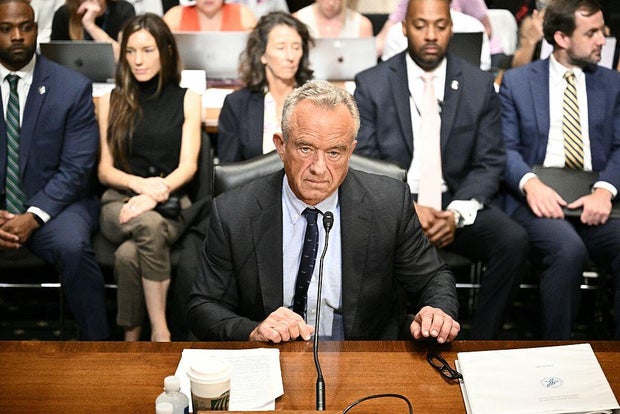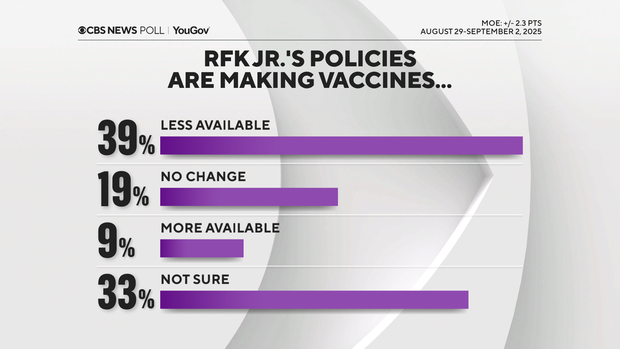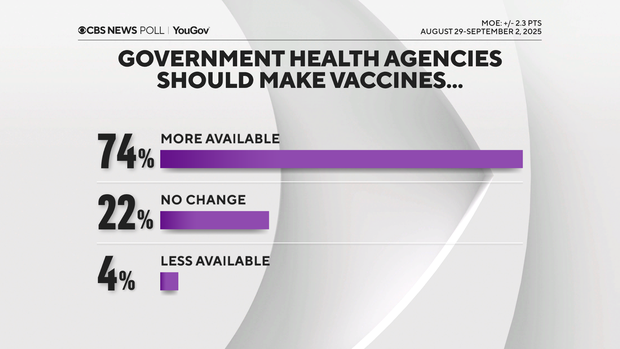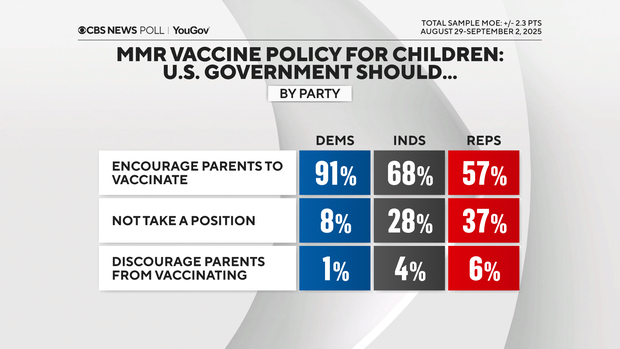Watch Live: RFK Jr. testifies at Senate hearing amid CDC backlash

- Health and Human Services Secretary Robert F. Kennedy Jr. is testifying before the Senate Finance Committee, where he is facing tough questions from Democrats on his record in office, the Trump administration's policies on vaccines and the recent ouster of top officials at the Centers for Disease Control and Prevention.
- In several fiery exchanges, Democrats said Kennedy should resign or be fired. Sen. Ron Wyden of Oregon said Kennedy shouldn't "be within a million miles of this job." Sen. Maria Cantwell of Washington called him a "charlatan."
- Kennedy defended the CDC shake-up in his opening statement, saying changes at the health agency were "absolutely necessary" because of how the CDC performed during the COVID-19 pandemic. He denied pressuring the ousted director to preapprove vaccine recommendations from a panel he replaced.
- Watch the hearing live in the player above.
Sen. Ron Johnson, a Wisconsin Republican, defended Kennedy, thanking the secretary for "putting up with this abuse" at the hearing. Johnson said his time allowance wasn't enough to "refute all of the falsehoods that have been confidently spewed during this hearing."
Sen. John Barrasso of Wyoming, a Republican and a physician, said he was "deeply concerned" about how Kennedy and the CDC's vaccine panel are approaching recommendations.
"Secretary Kennedy, in your confirmation hearing, you promised to uphold the highest standards for vaccines. Since then, I've grown deeply concerned," Barrasso said. "The public has seen measles outbreaks, leadership at the National Institute of Health questioning the use of mRNA vaccines, the recently confirmed director of Centers for Disease Control and Prevention fired. Americans don't know who to rely on."
Barrasso cited polling showing that a large majority of voters, including Trump voters, believe vaccine recommendations should come from "trained physicians, scientists, public health experts." He asked what steps Kennedy would take to "ensure vaccine guidance is clear, evidence-based and trustworthy."
Kennedy said he would "make it clear, evidence-based and trustworthy for the first time in history." Under his leadership, he said, the agency is going back to perform observational studies on existing vaccines, while new vaccines will have to demonstrate safety. He said the efforts intend to allow people to "understand the risk profile of those products and make good assessments for their own health."
Asked by Barrasso about safeguards for science-based vaccine recommendations at the upcoming panel meeting, Kennedy said, "Americans have lost faith in CDC, and we need to restore that faith. And we're going to do that by telling the truth and not through propaganda."
"We're going to tell them what we know, we're going to tell them what we don't know, and we're going to tell them what we're researching and how we're doing it and we're going to be transparent," Kennedy said. "It's the only way to restore trust in the agency, by making it trustworthy."
Sen. Mark Warner, a Virginia Democrat, questioned Kennedy about COVID-19 deaths, asking if he accepts "the fact that a million Americans died from COVID."
"I don't know how many died," Kennedy said, adding "I don't think anyone knows that because there was so much data chaos coming out of the CDC."
"This is the secretary of health and human services," Warner said, asking if Kennedy believes the vaccine did anything to prevent additional deaths.
When Kennedy said he would like to see the data, Warner responded, "You've had this job for eight months and you don't know the data about whether the vaccine saved lives?"
Kennedy said the Biden administration's data was "absolutely dismal."
Sen. Maria Cantwell of Washington continued questioning Kennedy's position on mRNA vaccines, saying his stance on the technology is at odds with science.
"The mRNA technology is about continuing the research to be ready for the next flu, influenza, the next pandemic," Cantwell said.
Kennedy replied, "You are so wrong on your facts."
"You're a charlatan. That's what you are. You're the ones who conflat chronic disease with the need for vaccines. The history of vaccines is very clear," Cantwell fired back, pointing to a chart that compared disease and vaccine rates in the 20th and 21st century, showing that several diseases have been nearly eliminated. "You don't want to support that evidence."
In perhaps the most highly anticipated line of questioning of the hearing, GOP Sen. Bill Cassidy of Louisiana questioned Kennedy over vaccine policy and changes to the vaccine advisory board.
Beginning the tense exchange, Cassidy said he was approaching the line of questioning as a doctor and not a senator, saying, "I am concerned about children's health, seniors' health, all of our health, and I applaud you for joining the president in a call for radical transparency. Thank you for that."
Cassidy framed his questioning about vaccines by asking whether Kennedy thinks Mr. Trump deserved a Nobel Peace Prize for Operation Warp Speed, the effort to develop and distribute COVID-19 vaccines during the pandemic. Kennedy said he "absolutely" agreed. Cassidy then asked why Kennedy attempted to restrict access to the vaccine.
"This just seems inconsistent that you would agree with me, the president deserves a tremendous amount of credit for this," Cassidy said.
Kennedy explained that "the reason that Operation Warp Speed was genius" was because it got the vaccine to market which "perfectly matched the virus at that time" and was "badly needed." But Kennedy said what he began objecting to was President Biden's mandates.
Cassidy also voiced concerns about Kennedy's replacements on the vaccine advisory panel, citing possible conflicts of interest that Kenedy denied.
The Louisiana Republican because of HHS' latest COVID-19 vaccine protocols, "effectively we're denying people vaccine."
In a heated exchange, Sen. Michael Bennet, a Colorado Democrat, accused Kennedy of appointing a doctor to the vaccine panel with controversial views, including about harm caused by mRNA vaccines.
Bennet noted that the agenda for the Sept. 18 vaccine advisory committee meeting is set to include discussions of vaccines for COVID-19, Hepatitis B, RSV and the MMRV measles, mumps, rubella, varicella vaccine.
"These are common back to school vaccinations for children all over the industrialized world," Bennet said. "If you change that, you owe parents in Colorado and across the country the benefit of some transparency."
"All these vaccines are free and accessible to parents today in America, who have the freedom to be able to make that choice for their children. Will that be true after your hand-picked panel makes their judgments about these vaccines?" Bennet asked.
"I think that parents should be free to —" Kennedy said.
"I know, you said that before, I do too," Bennet interrupted.
"— to make their own choices," Kennedy continued.
"So will they be just as free after these recommendations?"
"I assume they will be," the secretary said.
Wyden brought up an op-ed in the Wall Street Journal by the recently fired CDC Director Susan Monarez. Monarez wrote about a meeting she said she had with Kennedy before she was ousted. "I was told to preapprove the recommendations of a vaccine advisory panel newly filled with people who have publicly expressed antivaccine rhetoric," Monarez claimed.
In June, Kennedy said he was "retiring" all 17 members of the Advisory Committee for Immunization Practices, independent medical and public health experts who advise and vote on the CDC's vaccine recommendations. Kennedy replaced the committee members with eight of his own picks.
Kennedy said Monarez's claim wasn't true, adding that he never had a private meeting with her and that other witnesses could attest to his account.
"So she's lying today to the American people in The Wall Street Journal?" Wyden asked. Kennedy responded, "Yes, sir."
Kennedy also defended his move to replace vaccines on the panel, saying he "depoliticized it."
Crapo asked Kennedy about the investment to rural hospitals, after Congress passed and Mr. Trump signed legislation allocating $50 billion for them.
"These institutions are not just delivering health access to rural Americans, but they are economic centers, they are cultural centers for those communities," Kennedy said. "So when they die, the communities collapse. President Trump promised to do something about that and he has delivered on that promise."
The rural hospital fund came as part of the Mr. Trump's One Big, Beautiful Bill, which along with funding defense, energy and tax priorities, made cuts to Medicaid. The law will lower provider taxes, which states use to help fund their portion of Medicaid costs. Lawmakers sought to supplement the cuts with a rural hospital stabilization fund after some GOP senators expressed concern over how rural hospitals could be impacted.

Kennedy defended the firings and resignations at CDC, citing what he views as their failures during the COVID-19 pandemic.
"These changes were absolutely necessary adjustments to restore the agency to its role as the world's gold standard public health agency, with a central mission of protecting Americans from infectious disease," Kennedy said.
Kennedy said CDC officials "failed that responsibility miserably during COVID," blaming the agency for business closures and masking at schools, among other things, even though states and localities largely made those decisions.
"The people at the CDC who oversaw that process, who put masks on our children, who closed our schools, are the people who will be leaving," Kennedy said.
Kennedy began his remarks by acknowledging an officer who was killed in a shooting at CDC's main campus in Georgia in August.
The secretary celebrated the work that the administration is doing to combat chronic disease, which he's made a key tenant of the Make America Healthy Again agenda.
"Under President Trump's leadership, we at HHS are enacting a once-in-a-generation shift from a sick-care system to a true health care system that tackles the root causes of chronic disease," Kennedy said. "Chronic disease has reached crisis proportions in our country, and finally we have an administration that is taking action."
Kennedy's opening statement was briefly interrupted by shouts from a protestor.
The secretary also committed to doing more to address health conditions in tribal communities and making HHS resources more available, while citing the administration's commitment to rural health transformation.
Sen. Ron Wyden laid into Kennedy in his opening statement, saying the secretary was responsible for fueling "mistrust" in the U.S. health care system.
"Families are confused," Wyden said. "They're scared about who to trust about their health care. Robert Kennedy and Donald Trump have done so much to feed that mistrust."
Wyden specifically went after Kennedy for his dismantling of the vaccine structure, claiming Kennedy's family and allies stand to potentially make financial gains from his decisions. Wyden said it's "been obvious from the start that Robert Kennedy's primary interest is to take vaccines away from Americans," Wyden said.
"His agenda has not been about choices and information for families," Wyden said. "Just last week, he threatened doctors that deviated from the new anti-science vaccines guidelines he released that make it harder for pregnant women and children to get the COVID vaccine."
"Every single day, there has been an action that endangers the health and wellness of American families," Wyden said. "Robert Kennedy has elevated conspiracy theorists, crackpots and grifters to make life-or-death decisions about the health care of the American people."
Wyden said he doesn't think Kennedy "should be within a million miles of this job."
"It is in the country's best interest that Robert Kennedy step down, and if he doesn't, Donald Trump should fire him before more people are hurt by his reckless disregard for science and the truth," Wyden said.
Wyden asked the committee to formally swear in Kennedy as a witness "given the unprecedented nature of the witness's behavior," but Crapo objected, saying "we will let the secretary make his own case in his opening statement.""This committee's unwillingness to swear this witness is basically a message that it is acceptable to lie to the Senate Finance Committee about hugely important questions like vaccines," Wyden said.
Chairman Mike Crapo, an Idaho Republican, lauded the administration's "steadfast commitment" to work to improve the nation's health in his opening statement. He made no mention of the recent drama at the CDC or controversy surrounding vaccine policy.
Crapo acknowledged that he expects a "spirited debate today." But he praised the committee for its "deep history of bipartisan health care accomplishments."
He touted the administration for its efforts to combat " waste, fraud and abuse in our federal health care programs," along with HHS' "renewed focus on tackling the root causes of chronic disease and promoting prevention first."
"Mr. Secretary, I look forward to hearing from you today about the administration's effort to Make America Healthy Again, and how we can continue to work together to achieve this shared goal," Crapo said.
Kennedy arrived in the crowded hearing room inside the Dirksen Senate Office Building, taking his place at the witness table in front of a flurry of photographers just after 10 a.m.
The HHS secretary released a video late Wednesday outlining his posture toward the CDC, saying it was "once the world's most trusted guardian of public health," with a "simple and noble" mission to protect Americans from infectious disease.
"But over the years the agency drifted," Kennedy said. "Bureaucracy, politicized science and mission creep corroded that mission and squandered the public trust."
Citing the COVID-19 mandates under the Biden administration, among other things, Kennedy accused the agency of putting "politics ahead of evidence-based medicine."
"Trust has collapsed," Kennedy said. "President Trump has asked me to restore that trust and return the CDC to its core mission."
Kennedy said "the path forward is clear — restore the CDC's focus on infectious disease, invest in innovation and rebuild trust through transparency, and by restoring confidence."
"Most CDC staff are honest public servants who are trying hard to accomplish their jobs," Kennedy said. "With this renewed mission, they can do their jobs without politics or fear. Together we will rebuild CDC so that it will once again be the world's most trusted authority on infectious disease."
A new CBS News poll finds Americans tend to believe Kennedy's policies are making vaccines less available rather than more available. But the large majority of Americans feels government policy ought to make vaccines more available if people want them.

A sizable third haven't heard or aren't sure.

There's a wide view among Americans that government policy should encourage parents to vaccinate their children for diseases like measles, mumps and rubella, more specifically. Only a scant few think the government should discourage that.
Even as vaccines — particularly COVID vaccines — have sometimes been a political issue, this view on encouraging children's vaccinations is true across party lines for the majority of Democrats, Republicans and independents. (Republicans are less likely than Democrats to say outright encourage.)

Read more here.
Ahead of the hearing, more than 1,000 current and former HHS employees penned an open letter on Wednesday calling for Kennedy to either resign or be fired.
The letter — whose signatories were not publicly named — accused Kennedy of "endangering the nation's health." It cited last week's upheaval at the CDC, the Food and Drug Administration's decision to rescind emergency approvals that made the COVID-19 vaccines available for young children and the elevation of what they called "political ideologues who pose as scientific experts" to key vaccine approval posts.
Read more here.
- What: HHS Secretary Robert F. Kennedy Jr. testifies before the Senate Finance Committee
- Date: Thursday, Sept. 4, 2025
- Time: 10 a.m. ET
- Location: Capitol Hill
- Online stream: Live on CBS News
Members of the Senate Finance Committee previewed their questions for Kennedy to reporters this week, with some expressing concern about the recent CDC departures and others offering support for Kennedy.
Sen. Thom Tillis, a North Carolina Republican, told reporters Wednesday that he shares the concerns that Cassidy has expressed. "I need to know why his actions aren't matching up, or why his words in the confirmation hearing aren't matching up with some of the deeds," he said.
Sen. Ron Wyden of Oregon, the ranking Democrat on the Finance Committee, said he wants to hear from Kennedy that "vaccine access is what he wants."
"What he told the committee during the hearing is very different from what he's done," Wyden said, referring to Kennedy's confirmation hearing in February.
GOP Sen. Roger Marshall of Kansas said he's hoping to give Kennedy a "chance to tell his story and his motivations, rather than jumping off the Democrat narrative, which is just wrapped around the axles on vaccines, like that's the only thing in life that matters."
Sen. Ron Johnson, a Wisconsin Republican, told CBS News: "I fully support what he and President Trump are doing trying to restore integrity and credibility to the federal health agencies and to science."
When asked what he hopes to hear from Kennedy at the hearing, Senate Majority Leader John Thune told reporters Wednesday that "we need stability" following the CDC director's ouster from her role less than a month after the Senate confirmed her to lead the public health agency. The CDC is part of HHS.
"We go through all the work and confirm somebody to one of these important posts, and then a month later they're gone," Thune said. "We need stability. He's in charge of the department, and he needs to restore public trust in the CDC."
Thune added that "whoever ends up in that position, it shouldn't be disqualifying to be in support or in favor of vaccines." CBS News reported last week that Jim O'Neill, the deputy secretary of the Department of Health and Human Services, has been selected to serve as the acting director of the CDC.
Nine former CDC directors penned an op-ed earlier this week condemning Kennedy's leadership in the aftermath of the firing of the CDC director last week, claiming he is "endangering every American's health."
In their op-ed, the former CDC directors who served under both Democrat and Republican administrations, pointed to a number of decisions by Kennedy that they say are "unlike anything we had ever seen at the agency," including canceling investments into medical research and the move to replace members on a key vaccine advisory committee, among other things.
"Firing Dr. Monarez — which led to the resignations of top CDC officials — adds considerable fuel to this raging fire," the former CDC directors added.
Read more here.
Kaia Hubbard is a politics reporter for CBS News Digital, based in Washington, D.C.
Cbs News





